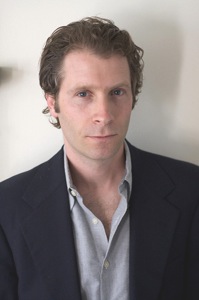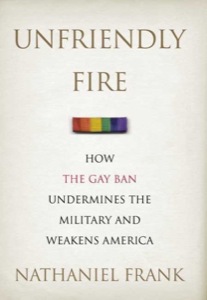-
- Vermont legalizes same-sex marriage with veto override
- U.S. patient tests positive for HIV after mistakes
- Indiana debates impact of Iowa ruling
- Same-sex marriages expected to begin in Iowa April 24
- Md. gay-rights advocates seek spousal benefits
- Tennessee debates impact of Iowa ruling
- National News Briefs
- World News Briefs
Interview
Fear doctrine
‘How the Gay Ban Undermines the Military and Weakens America’
Published Thursday, 09-Apr-2009 in issue 1111
Last month, Congress introduced the Military Enhancement Readiness Act (MREA) to repeal “Don’t Ask, Don’t Tell” (DADT) the current ban on military service by openly lesbian, gay and bisexual Americans.
MREA would replace the current law with new provisions prohibiting discrimination based on sexual orientation in the Armed Forces. Last year, the MREA had 149 bipartisan cosponsors.
Meanwhile Servicemembers Legal Defense Network – a national, nonprofit legal services watchdog is working with key allies to introduce parallel legislation in the U.S. Senate.
Last week, however, the Obama administration stated that it will delay work on repealing DADT as it confronts more pressing matters. Nathaniel Frank, the nation’s top expert on the gay ban, persuaded key military authors of DADT to admit they ignored evidence and exaggerated the threat posed by gay service.
Frank recently made an appearance at The San Diego LGBT Community Center to discuss the policy, which he says started with and continues to be supported by misinformation, fear and prejudice. He also sat down with the Gay & Lesbian Times to discuss his recently released book Unfriendly Fire: How the Gay Ban Undermines the Military and Weakens America.
Gay & Lesbian Times: Why did you decide to write on the subject of gays and lesbians in the military?
Nathaniel Frank: I have a personal reason and an academic reason. The personal reason is I was graduating college and coming out of the closet myself in 1993 when this issue came along. Recognizing how important it was for me, to be able to be myself, I was frustrated and kind of embarrassed as an American to see a law come along that punished people for doing the same thing that was so crucial to my own mental health.
The academic reason is similar. I was training to be a historian in graduate school following graduation from Northwestern and was embarrassed again that my country chose to write into law a policy that was based on denial and self-deception. Everyone had omitted that there were gays in the military and this was a question of whether we could let people say it and by extension whether the country could face things that were sometimes difficult truths for some people, like talking about the tough issue of homosexuality. I just was fascinated by how the country fared that test.
GLT: Why do you think the argument of unit cohesion was used to support DADT when there really wasn’t any evidence?
NF: Well it’s pretty clear why it was used because this was not about evidence, it was about emotions. I go through that in some detail in Unfriendly Fire to help people understand what exactly goes on when people who know better or should know better come up against a brick wall. For some people, there were some real fears that this would undermine unit cohesion. Some people thought the sky would fall, but many people knew better and acknowledged as much. They said, ‘this isn’t about unit cohesion; this is about morality. This is what my religious book says I should do, and we’re going to come up with whatever way of selling this policy to Americans we can.’ That was how the whole idea of unit cohesion was born.
GLT: Critics of your book have said that overturning DADT will cause the military to lose even more troops. What do you say in response?
NF: In Britain and Canada, when they polled their servicemembers before lifting the ban, a third of them said the same thing – far more than say it in the U.S. And it didn’t happen. The research shows again and again that this kind of survey is an opinion. It doesn’t predict what people will do. We know that has not been the case elsewhere. Not only that, we know that’s not the case here. Gays are not only serving in the U.S. military, they are serving openly by the thousands. We have data on that, and we still have a military.
GLT: Why do you think we are one of the last Western countries to continue banning gays and lesbians from serving openly in the military?
NF: We have a religious right in this country that is not matched in most other Western countries. In Unfriendly Fire, I argue that that force that came into play in the early ’90s was instrumental in insuring that Clinton would fail to lift the ban. So the social conservatives, the puritan heritage of American culture, evangelicals inside and outside the military worked together to defeat reform on this issue, and they won that round.
GLT: In the book, you say that gays and lesbians have largely assimilated in the military. How do you think this happened?
NF: The culture changed tremendously in the country over the last two decades. The military is not immune; it is not an island. The policy hasn’t [changed], but the reality on the ground has been totally at odds with the very assumptions of this policy, which are that if you let open gays serve, the military will have problems. Yet gays are already serving, not just serving but serving openly. This is the ‘Will and Grace’ generation. We’re almost beyond that generation. Time is marching on – the closet is increasingly looking foreign to more and more young gays and straights. Now the question is will rhetoric and our policy catch up to the reality?
GLT: While you were writing and doing research for the book, was there anything that surprised you?
NF: I was surprised about two things. First, was just how damaging the policy is in ways that a lot of people didn’t foresee, that discharges actually skyrocketed, that harassment went up, that there continued to be witch hunts. Lives and careers are still wrecked under a policy that was supposed to make sexuality a non-issue; it made it into a bigger, tougher, more disruptive issue.
Secondly, I was surprised with how many people who participated in creating Don’t Ask, Don’t Tell were willing to tell me 15 years later that this was a policy based on nothing, that it wasn’t objective, that they didn’t look at empirical research and that it was based on fears and prejudice. A lot of us suspected it but to hear it from the people who formulated the policy was a bit of a surprise.
GLT: Do you think the policy will be overturned with this administration?
NF: It’s tough to predict what will exactly happen. There is a lot of momentum. The short answer is with this administration, yes. I don’t think the policy can survive another four years because the public is resoundingly against it, up to 80 percent, and the president and Democrats in Congress, and they of course control Congress, have said they want to get rid of it. Even the military is beginning to see the toll it’s taking, both in terms of critical talent and the reputation of the armed forces, which is seen as increasingly out of step with the rest of society. There are forces of political inertia that may keep it in place longer than it should be in place – that’s already happened, so it’s tough to know when. But I do think it will be under Obama.
Unfriendly Fire: How the Gay Ban Undermines the Military and Weakens America A Thomas Dunne Book
$25.95
|
|
Copyright © 2003-2025 Uptown Publications



